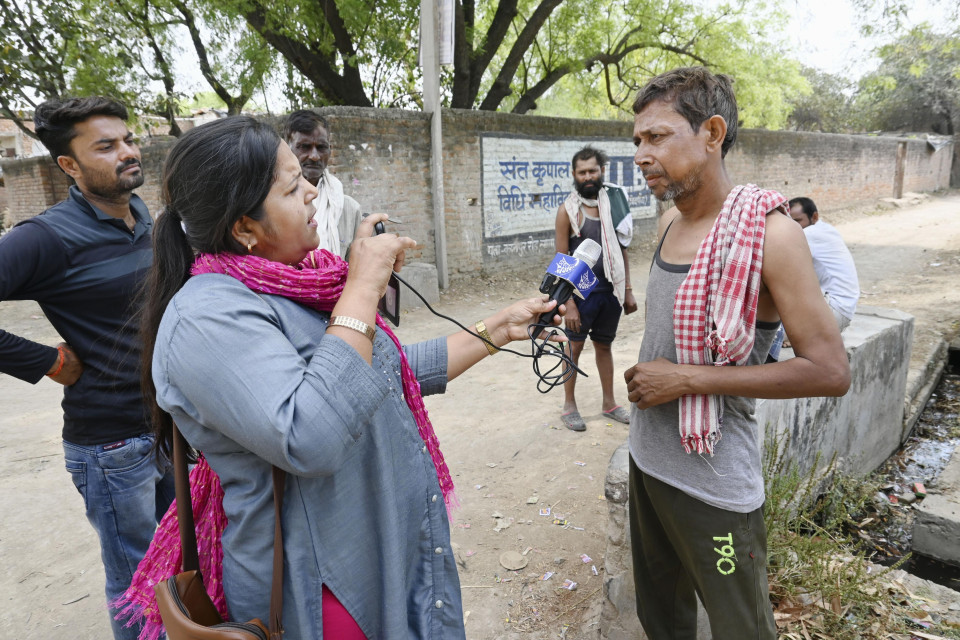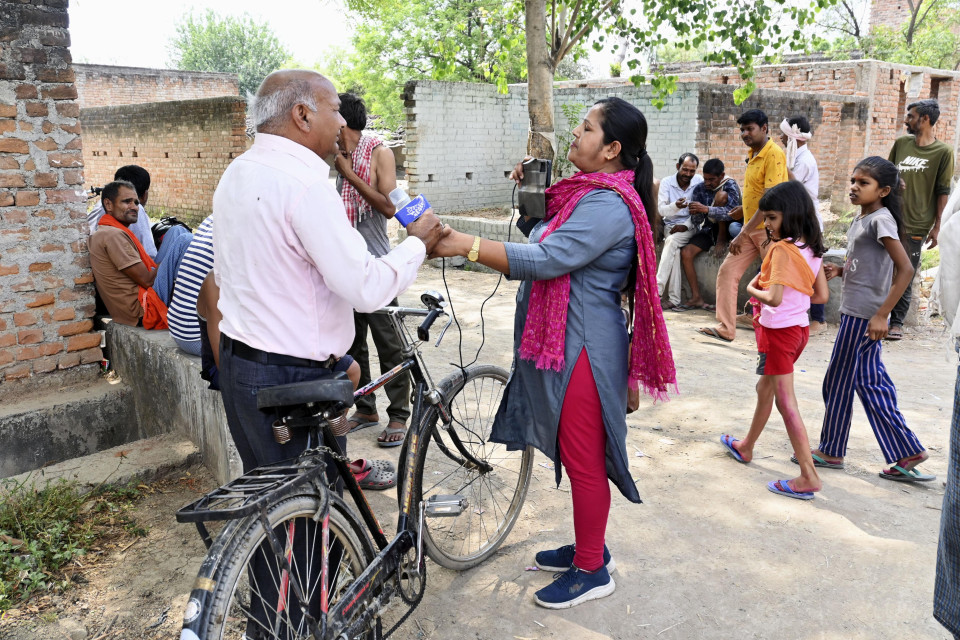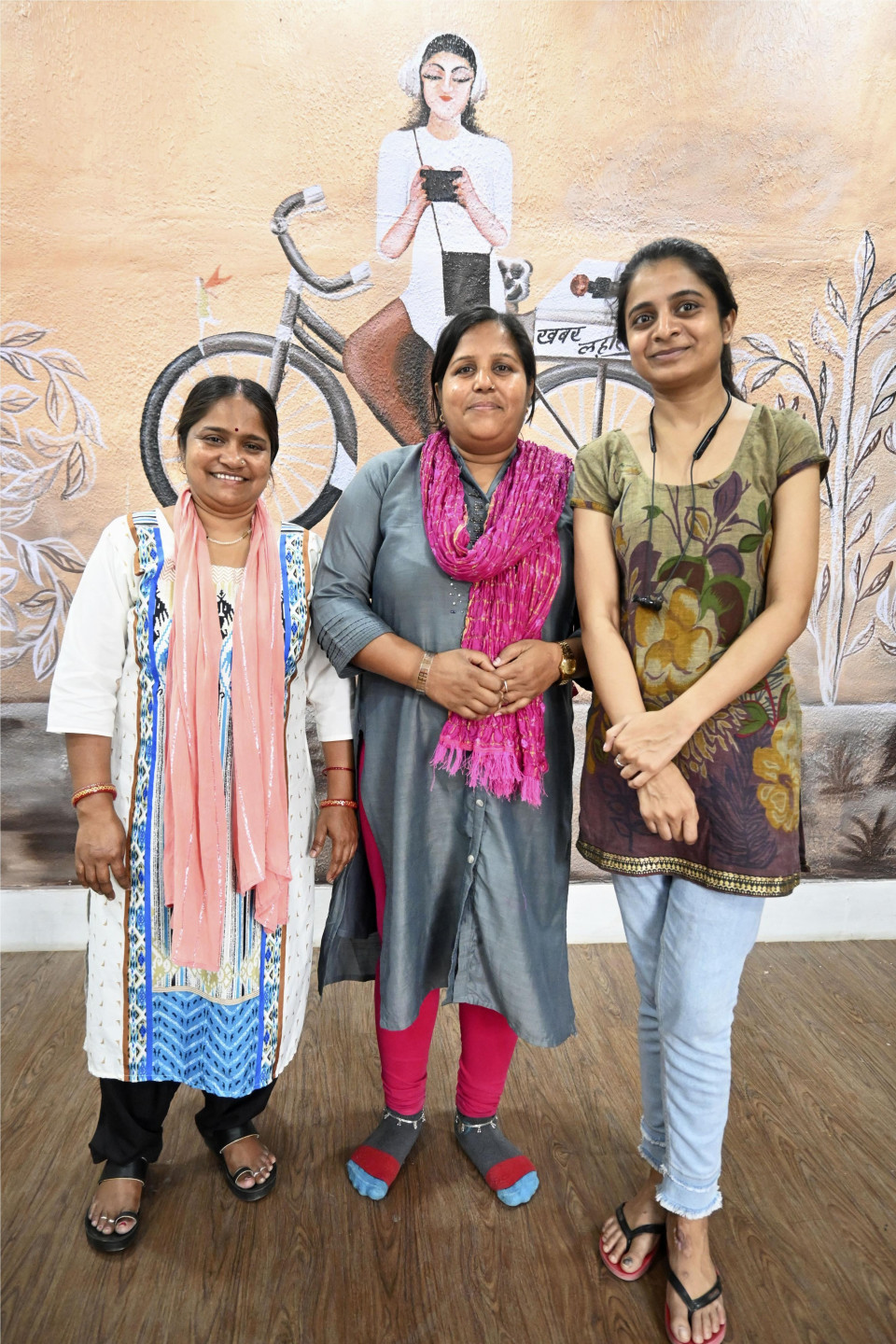Geeta Devi normally starts her mornings traveling far away, usually by rickshaw or bus, from the small regional city of Banda in India.
Today, she travels with Kyodo News by car from Banda in the northern state of Uttar Pradesh to the village of Jamalpur in the same state.
Geeta, who could easily be mistaken for an ordinary Dalit oppressed-caste woman, stands out from her neighbors in her rural community once she begins her day as a hard-nosed reporter shedding light on the plight of Indian society's most marginalized people.
Carrying a small bag containing a notepad, pen, water bottle and her most precious item -- a microphone attached to her smartphone -- Geeta interviews the farmers and common people she meets to later share their stories via video for an online news portal.
The news portal, which became the subject of the Academy Award-nominated Indian documentary "Writing with Fire," was founded in 2002 as a newspaper led by Dalit women, belonging to the lowest caste in the traditional Hindu social hierarchy, to closely cover issues affecting rural villages that are often overlooked by mainstream media.

"I never had any plans to join the news field. I was not that educated and only studied until elementary school before joining Khabar Lahariya," said 37-year-old Geeta, whose reporting career based in Banda began in 2009.
As she walks through the lanes and houses of the village, Geeta is determined to record the thoughts and grievances of the farmers facing eviction, who lament being compelled to sell their land to the government for the construction of highways and expressways.
The administration of Prime Minister Narendra Modi boasts that it has doubled the highway network in its first decade in office. While many people will benefit from the improvements of arterial roads linking cities, the livelihoods of people in the villages that they intersect will be severely disrupted.
"What is the point of fighting for a temple or mosque when the farmers have to give up their land? Where will the money come from for us?" a farmer says while Geeta records with her smartphone.
"Land creates wealth time and again, but the money you get from an eviction comes only once. You never know if you will be able to get a piece of well-watered land again," complained one older farmer.
"Prime Minister Modi may be good at big talk like international strategy and diplomacy, but the farmers are suffering," he added.
After wrapping up her news gathering, Geeta enlists a passerby to record a video on her smartphone introducing the day's coverage of eviction issues in the village, to be edited for release after she returns to the Khabar Lahariya office.

Geeta was born in a rural area near Banda where education only went up to junior high school, and it was customary for women in their mid-teens to marry and start families. Unable to afford further education, she married at the age of 15.
On her journey to becoming a reporter to speak truth to power for the common people, she has faced many trials, especially living with her conservative in-laws who were disrespectful toward her.
Eventually, she summed up the courage to leave her husband in order to provide a healthy environment for her three children, whom she gave birth to at an early age. Because of this experience, she believes she understands the suffering of rural people, especially women, better than almost anyone.
"In villages, a woman is identified as someone's daughter or wife or maybe daughter-in-law. You don't get to have your own identity," she said.
Khabar Lahariya, literally meaning "News Wave," initially established itself as a chain of local language newspapers published in various dialects of Hindi in the states of Uttar Pradesh, Madhya Pradesh and Bihar.
It currently has about 40 staff members, including female journalists, editors and a production team, and now largely relies on its digital platform to report the news on YouTube, substantially increasing its audience.
Geeta's interest in education inspired her to become a single parent while dedicating her life to meaningful work that creates value in society. "I always wanted to do a job and have my own identity," she said.
Like Geeta, there are many such women who work for Khabar Lahariya, fighting in their own way to get their message out while claiming their identities in today's world.
"When I used to go for coverage, people never took me seriously and didn't believe that I was a journalist. They used to think that I was approaching them for some financial help, and thus they looked at me with skepticism. That thinking has changed now," said Meera Devi, editor-in-chief of Khabar Lahariya.
"We generally work on various topics, but with each our main concern remains to bring to the forefront those voices which are not heard by mainstream media, especially from rural areas," she added.

While their YouTube channel has around 591,000 subscribers and aims to increase that number in the future, Meera and her band of women journalists acknowledge the dangers of reporting because of the crime segments they also cover in their news stories.
"There have been days when people have visited our reporters' homes to threaten them in order to stop reporting about particular issues," Meera said. But she believes that now, with so many years of experience, they have learned to face such scenarios head-on.
"We are prepared mentally and less afraid compared with the past," Meera said.
Amid a chaotic political, social and criminal situation in rural areas, reporters of Khabar Lahariya work with the motive that their efforts will lead to a wave of social justice rather than achieving acclaim for themselves.
Even so, their reporting in which they determine not to flinch from prejudice or discrimination, gained recognition when "Writing with Fire," directed by filmmakers Sushmit Ghosh and Rintu Thomas, was nominated for an Academy Award in 2022. The film was released last year in Japan.
They consider it their mission to amplify the voices of rural populations, but what is concerning is the increase in those people afraid of taking a stand themselves against the Modi administration.
Fear of the powerful Modi government, which has stifled opposition parties and decisively enacted harsh policies against the Muslim minority, has quietly spilled over into rural areas.
While Geeta was covering the eviction issue, one man told her, "If they find out I'm complaining about Prime Minister Modi, I could get in a lot of trouble later."
But for the women of Khabar Lahariya, their attitude toward their work defines women's empowerment in a male-dominated society, where not only Dalits or other lower classes but even women considered of higher status struggle to survive.
"I will continue working as a reporter until the time I want to and until the time I'm no longer capable to run and travel to different places. I love this job and enjoy each and every second of it," Geeta said.
Related coverage:
FEATURE: India's "cremation king" helps to bring salvation in modern times
 By Rini Dutta,
By Rini Dutta,









 By Mei Kodama,
By Mei Kodama,